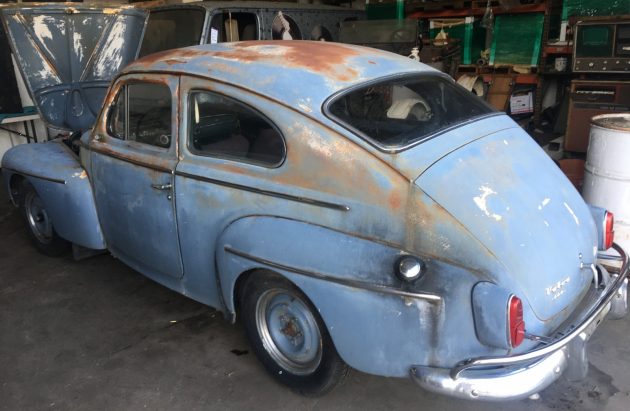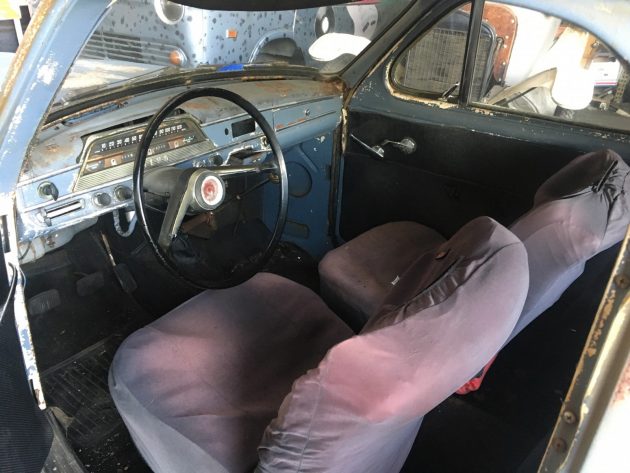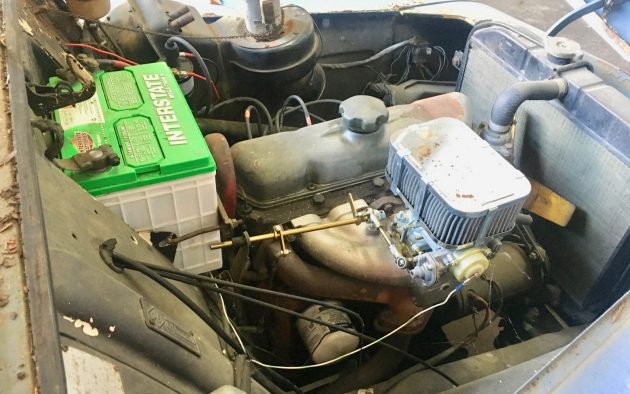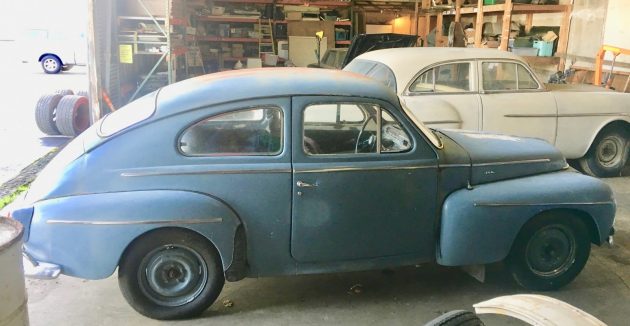When we see a car left outside to wither away we wonder why and perhaps we even feel a bit angry. Perhaps this once there’s a good reason if ever there could be one. It seems the old gentleman really loved this car, but with the onset of Alzheimer’s, his world slipped away. His last connection to his life was his beloved Volvo. So, his kids parked it outside his window. It’s hard to imagine it was parked there long enough for this amount of damage (or, uh, patina) to occur but Sacramento summers are long and hot. After he passed, this Volvo was driven until about a year ago. They had some work done on the engine including having the carburetor rebuilt, which still leaks. It appears to be a simple float bowl setting. The family gave up on the old Volvo and donated it to the museum I volunteer at.
The interior needs lots of work, including a dash top, various panels, and upholstery. Complete interior kits are available, but they aren’t exactly cheap. It is said to run and drive. There’s no sign of rust beyond the surface rust.
There’s the dusty little B18 1.8-liter engine introduced in 1962. Volvo also switched from a 6-volt electrical system to 12-volt in 1962. We haven’t tried starting it yet. The volunteer “pit crew” have several projects ahead of it, including the Packard parked beside it.
This side must have been on the shady side. These B10 Volvos have a dedicated following. It’s a much smaller group than the Tri-Five and muscle car crowds, of course, but they do love their Volvos. Do any of you Volvo folks out there have any idea what this one may be worth or any suggestion what to do with it? I’m thinking we should get it running and then sell it as it is. What do you think? You can contact Roy at the California Automobile Museum with any questions or suggestions via email here.








I would contact Volvo great show room car try Australia
not knowing what the financial resources of the Museum are my guess is that the best thing to do is get it starting, idling, running and stopping. note any major work areas and minor work areas then get it advertised in one of the local volvo forums.
this car is in very good shape considering its age and getting a decent price while sending it to a fanatic should be the goal.
i still like the amazon’s better but this car in particular is making me think about 544s.
Replace the aftermarket carb with the correct OEM setup which was twin SUs. Flush the fuel system and get it running. Service the brakes and exhaust, which will undoubtedly need work. Redo the interior with all the correct OEM parts, available through a Swedish-based vendor with a US warehouse in South Carolina. Leave the exterior exactly as is. The patina (and story) is what makes the car special.
I had a Volvo like this one, but, it was called a 444, not the 544 as listed. I believe it came from Canada, and had one simple carburetor. Ran like a top.
Needed a bigger car so I bought a 122 sedan. Not a bad car either. Hope someone buys it and runs it as-is. Good luck old friend (Volvo).
Great car and a touching story! As redwagon commented.. get it starting, idling, running and stopping. Running gear parts are available from IPD, VP-Autoparts or iRoll-Motors.. place ads in craigs-list, vcoa.org, ipd classifieds.. Good luck
Of course place an ad here too when you determine what the price is…
Own both 56 Chevrolet Bel Air H.T. and Volvo’s they were high quality,The 544’s arrived in California in 1957 they sold more here than over there and we soon found out how well built the cars really were,it’s too bad the rear wheel drive’s last year was 1997……………..Bummer………..
I would buy it for the right money, I have been going to the museum for 30 years. Used to know the guy with several horse drawn vehicles on display including an incredible omnibus. It looks to me like the carburetor is the problem here, looks like an aftermarket Holly kit that were popular but never worked as well as the original SU’s. American mechanics have always struggled making them work so many converted them to a single Weber/Holly. I like this car a lot, I built an early 444 and converted it from a B16 to a B20. The challange was the clutch, as I remember the B18-20 engines used a hydraulic actuator instead of a mechanical so it took some engineering and a new pedal assembly. So…..I would give 1500.00 for it as is and pick it up. These are undervalued cars that built the Volvo reputation as a solid bullet proof car that Volvo eroded starting in the early 70’s when they started building more complicated vehicles.
$1500 is probably a little less than they are hoping for, but give Roy a call. You never know. The Pit Crew is stretched pretty thin with other projects.(want to help?) Hey, I cleaned up a couple of sets of wheels on Monday that were hanging around and they sold on Tuesday for $1500!
I have to come from Idaho to pick it up……….otherwise I would have offered more. I have been going to that Museum since it was part of the Towe Ford. I have a body and restoration shop and would make this old girl shine……but between shipping and cost of restoration, I would be over my head if we paid much more.
Dave, the series uses a mechanical clutch which is a bonus over the 120 series. The M40 tranny used with B16,18 and 20 has no problem with any of these mounts, just a few readily available parts.
One thing that is frustrating is a car is donated to a museum and they sell it off right away only way I would donate a car is if there was a gaurentee it will remain available for people to see it
99% of cars donated are sold as fund raisers, same as donating a boat to the Boy Scouts or gun’s to the NRA. These institutions are expensive to operate even with the amount of volunteer help they get. In Sacramento, just keeping the lights on could cost 1200.00 a month. The Towe Ford Museum was founded in Deer lodge Montana and still exists there in the old state prison. The California Museum split off maby 20 years ago.
Actually, Towe got in trouble with the IRS and they auctioned off his collection in Sacramento. CAM had to start from scratch. a 1938 Buick was the first donation.
“The cars were moved to the Towe Antique Ford Museum in Deer Lodge in 1979. Some of the cars were moved to Sacramento in 1987 and there continued to be two antique Ford museums until the collection was sold to satisfy an argument with the IRS in 1997. It was the largest sale of antique cars from one collection ever. The cars went to Japan, Holland and many other places around the world. A large percentage, however, were purchased by local buyers which allowed them to be kept in their respective museums and both are still in operation as antique automobile museums today.” http://www.oldcarsweekly.com/news/hobby-news/famous-ford-collector-edward-towe-97-dies
I am a historical museum director and I understand your point. Most museums have a policy in place that outlines the terms of accepting a gift. There is usually a clause in there stating the museum has the option to sell an item. A majority of donors are fine with the possibility of a sale and if not, go elsewhere. The much needed funds derived get plowed back into the institution to keep it operational or to fund projects.
My 1st car was a ’58 444. It was a good, not great car, with several shortcomings (hope it doesn’t need back brakes, those drums can be a pain, hey Jesse?) I remember they were very popular for a while, I had several parts cars, and knew neighbors that drove 544’s too. Most were junked, so it’s nice to see one intact. Since someone replaced the carb and manifold, I’d fix it, but leave it as is. There’s still a huge following for these, and you should have no trouble selling it.
Yep, those rear drums are especially hard to get off if the last owner has used the wrong tool and split the end of the axle. Order the correct puller guys!
I’m a Volvo enthusiast. I worked in Scandinavia as a young man. Denmark, Norway and Sweden.
Lovely countries 😊.
My daily driver is a 1985 Volvo 240. I rescued it in May of last year.
I’m retired now. Disabled. Need something to keep me busy (read as ‘sane’.
I would love this. I’m in Canberra, capital of Australia. I organised shipping a car from the USA before, it was fine and not too expensive.
The car is worth more than $1500. It depends on floor and firewall condition. They’re not cheap cars to restore; but they’re ‘good’ cars to restore. Strong.
I’ll try to contact Roy and see if he would be willing to send it to an old bloke in the upside down country with big springy two legged mice 🇦🇺.
Would make me very happy to slowly and steadily restore the old chap’s car. I would leave it ‘as is’ as far as possible. I agree that the patina and story are part of what makes it so special 👍🏼.
Best regards
Anthony
My driver is all original and saving this one will be inexpensive and easy compared to many other brands. They are safe and compatible in traffic, and get more smiles than most anything you can drive. The only other old cars like it tend to be the same ones Jesse likes!
I saw a Volvo {may have been a different style?}.., years ago,that had been wildly customized/chopped to look like a 50 Merc “lead sled” ,It was amazing.
This body style is very cool,and does resemble a 48 ford to me?
These are really cool,and are hard to find in as good shape as this.
Sad story,but at least owner got to”see”it everyday…,Hope new
owner will love it just as much..!
I’ve had a few of these, 50’s and 60’s. Great daily drivers, summer, and winter. Get it to start, run and stop and then auction it off. A PV lover will know what it’s worth.
Attn: Roy Saw pictures of 1962 Volvo 2 door sedan. I am interested in purchasing it as is and either having the work done or doing it my self. I live in CA so moving it to my home would be little problem. I am open to bid on the car and I would go higher than the $1500 that I see listed in the comments. I would offer $1800 and haul it from Sacramento to the Palm Springs area. If there are more offers, I might consider more. How are the tires on it, could it be towed or would it have to be moved on a trailot?
First of all, thank you for volunteering at the museum David ! I live in Sac and really enjoy the great cars you all have there. It’s a great story, and I hope someone takes the reigns and brings it back to stock. I’ve owned one Volvo, a 78 242GT. I’d love to get my hands on another one. They are pricey to fix, but they are TANKS, and they just keep going if you treat them right.
First of all, this is not a “B-10”. Somebody took a casual glance at the boot lid and read the logo incorrectly. What looks like a “B-10 with a spear through it is a “B-18” – designating the engine size. My dad bought a new 1960 B-16 and sold it to me in ’62. That car was bulletproof. I never drove a B-18, but they must have been great. I remember winding our B-16 up to way over 75 mph to pass another car on a two-lane, then upshifting about three-quarters around the other car so the other driver could hear it. Not spectacular like the American V8s, but fast enough to be a lot of fun.
Ours was the six-volt version, and on -30º Minnesota mornings, it was a dramatic hoot to start. My fingers could freeze to the ignition key in the process. At first you’d hear one pathetic moan from deep in the bowels of the car (the starter): “rrrrrrrrrrow…”. Then silence. With any other car in the world, I would be off looking for a jump already, but with that Volvo, I’d wait. “rrrrrrrrow” said the Volvo again. Then about five seconds later: “rrrrrrrrow”. Another five seconds. “Rrrrow-rrrrrrrow”. Maybe it would repeat this sound two or three more times. Then “Row-row-row-row-row-ro-ro-ro-ro-roorororororo
r‡flfi‡fl°·°‡‡fl›flfi›fl‡fi•¶ª•¶§•¶§…….. rrrrrrrow”. (&^%*^*)*(*&()*(*&)&fl°‡°‚·‡·°‚‡‹›fi‹!!!!!!!!!!!!!”. “*()&·°‡°·‡)(*‡·°&(^&*^&*(^&*&%$^O&*^&YI-VROOM. VROOM VROOM!
And then sometimes the shade covering the radiator would stick – and the chain would drop over the spark-plugs when you tried to release it. That would tickle!
And if you’ve never owned a Volvo 444, 544, or 120, you can’t imagine what I’m talking about! These cars were always fun!
Don’t forget the station wagon version of the PV series — the PV445 and P210 “Duett”. Always a crowd favorite. Here’s my 1967 P210.
Great cars! The 5 main bearing B18 is darn near indestructible, and the unit body construction yields a curb weight with a full tank of 2140 lbs. The rear suspension is similar to what they use in NASCAR today – trailing arms, coil springs, and a Panhard rod. I had a ’58 with a B18 back in the 70’s , and it was a hoot to be able to outrun a Triumph TR 3 on a twisty road !
I hope this car gets to live on. First thing to do, before trying to start it is to change the oil! Then drain & clean the fuel tank and radiator, replace the carb with the original SU setup, and tune it up. The brakes will probably need to be redone, and remember to replace the brake hoses !
http://www.classicVolvorestorations.com has many items for these cars, including weatherstripping, patch panels, fenders, fuel tanks, taillight lenses, etc, etc. Another source I’ve been told about is Swedish Treasures. There is a forum at swedespeed.com for these cars, so help and advice is only a mouseclick away. There is an active classic Volvo community in Northern California, and there is a VCOA meet in Davis in the spring.
If I didn’t already have mine, I’d be in line to get this one. Very difficult to find in this solid condition.
Always fun to read about the oldies. Seems you all missed to mention the critical weak spot of the lovely old hunchbacks besides rust, though; the front suspension which is known for dropping a spindle when pushed too hard around tight curves when speeding.
I didn´t now the P210 “Duett” was exported to the USA, and it´s nice to see so many stateside survivors. My estimation would be that the most left here in Sweden are silently dwelling in barns and garages since the past three decades or so, because that´s where i´ve been seeing them most oftenly since the original spare parts supply was scrapped by the Volvo company. Fortunally, that all changed with the rise of aftermarket suppliers such as the aforementioned VP Autoparts and the like that has introduced a lot of repro parts.
As for the P210 wagons, you´ll see even less of them around today although they were among the most common light trucks (built on a separate frame unlike the unibodied 444/544) on swedish roads, rivaled mainly by the VW bus for most light cargo duty.
Although the name 210 “Duett” suggested that these were thought out for double-duty doing small-business deliveries in the day and transporting the owners family in the spare time, only few was ever built with a rear bench seat in spite of the marketing guys proposals to the family men which over time turned in to a more practical approach lacking extras such as two-tone paint and other detailing. Still, the common variety delivery wagons had glass all around and steel sided panel wagons was almost only ordered (always in a bright orange color) by the state phone company for use as service vehicles filled up with tool boxes. There was also a small number built for ambulance use and these were the only ones built with a wide single door (but hinged to the side just like the usual 2 rear door wagons).
Since Volvo never built a real successor to them (the company decided that a stiffened 145 called Express with a raised fibreglass roof would suffice but few customers agreed as it had far less of the room or loading capabilities so there never was no 245 Express to follow), the 210 series was kept in hard use much longer than they propably would have elseways.
Therefore, the wear and tear along with a rough climate made the badly rusted majority a cheap prey in the seventies and eighties for young guys not quite of age for a full drivers license (that´s 18 years here). The 210 Duett was among the few light trucks a-plenty here at the time that confined with an old regulation that said you could convert a full-frame car into a cheap tractor for agricultural use and slow road traffic if you shortened the frame and left only enough of the body for a cabin with a back wall welded shut. Also, the gearbox had to be mated to another one just like it to reduce the speed to 30 kilometers an hour. These regulations was changed in the 80´s so some of the last converted was “merely” cut down to slabsided pickups reminiscent of australian utes in design and some few luckily turned in to slow moving but beautiful stepside pickups (wonder why the company never offered such) done in a style more like the few 445 pickups from the fifties (these were sold by Volvo as rolling chassies to have bodies built by aftermarket companies – a small number like around 20 or so was done as convertibles with beautiful 444-based 2-seater bodies built by a few swedish coachbuilders, most of these cars is said to remain today).
On a sunny summer night in Sweden, most of these semi-survivors are common sights cruising the city streets and burger joint parking lots of many swedish towns in the hands of new and proud young owners, often pampered and well maintained. Not that bad if you consider that hardly any of them would have been kept from being junked otherwise. If you´re lucky, you´ll spot an original 210 Duett or a 444/544 as well.
Now, let´s see… i know of one surviving 210 that was used daily by an old plummer until the guy retired some 8-10 years ago and the car along with him – it´s still around but needs some serious body welding and TLC to get rolling again, i popped the question last fall of making a deal and he answered that he would consider it. Me being cursed by the Blue Oval i guess i still ought to get back to him when the massive snow has started melting away and hear if he´s done thinking about selling it…